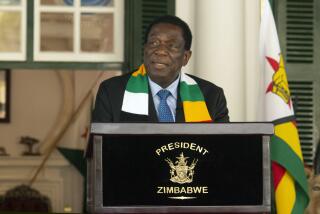‘We’re hopeful,’ Zimbabwean says of deal
- Share via
HARARE, ZIMBABWE — Like most people here, Brian Mwale has seen his hopes tempered by a long list of disappointments.
On the hot, dusty streets of Harare on Friday, people were talking of little besides the news that the country’s rival political leaders had agreed to share power after weeks of negotiations. With the deal still secret, and rumors flying like litter, the 28-year-old trader was feeling frustration, hope and cynicism -- all at once.
But, even after flawed elections and a campaign of violence by the ruling party, Mwale said he also felt in his gut that opposition leader Morgan Tsvangirai would come out on top.
When he heard Thursday on late TV news that Zimbabwe’s president of 28 years, Robert Mugabe, had signed a deal with Tsvangirai, “I knew that the ruling party’s time was over,” Mwale said. “We’re hopeful, but we know it’s not something that will happen in one day.”
Mwale, a structural engineer, is forced to work as a trader to survive. When he needs to restock his family’s food supply, he has to shop in a neighboring country because there is nothing to be found in Zimbabwe. Hyperinflation is almost beyond calculating, and life expectancy is among the lowest in the world.
“The economy is going down every day, every minute. Prices are changing all the time,” Mwale said.
As life gets harsher, beggars are multiplying on the streets of Harare, the capital, each with a desperate story. They knock on Mwale’s door several times a week.
On Tuesday, he said, the beggar was a civil servant from the Ministry of Local Government who had no food for his wife and two children. Mwale gave him enough for one meal.
“He’ll only come when he’s really desperate,” he said.
Mwale’s emotions chronicle the hopes and despair of Zimbabwe’s last six months.
On election day, March 29, he bounced out of bed and sniffed the air. He told The Times then that he was certain he could smell change. That night after voting, he went out and celebrated, playing Tsvangirai’s campaign song at top volume.
But the ruling party delayed the results for weeks, and when it released them, it said a runoff was necessary between Tsvangirai and Mugabe.
The next time Mwale spoke to The Times was June 27. Tsvangirai was boycotting the runoff because of the violence. Mwale felt bitter and tainted, forced to vote for Mugabe because of intimidation by ruling party thugs. He was not sure whether he could ever forgive himself for casting that vote.
But a bubble of hope reappeared last month as Mwale watched the opening of parliament on television, when the stiff pomp and ceremony were undermined by opposition members jeering Mugabe.
“It showed that he’s no longer respected. It showed that they don’t fear him anymore, because he was a fearsome leader, that one. A leader should leave office when he’s still respected,” Mwale said.
“He’s old. Age is going to force him out.”
Although the deal remains secret until Monday’s official signing ceremony in Harare, it is known that Mugabe would remain president and Tsvangirai would become prime minister. People close to the opposition and the ruling ZANU-PF party say the key to breaking a deadlock over who would have executive power was to set up two ministerial bodies to determine government policy.
But the same ministers would meet twice: first under Tsvangirai as the Council of Ministers to make recommendations to the Cabinet, then under Mugabe as the Cabinet.
But the opposition Movement for Democratic Change, combined with an MDC splinter faction, would have a one-seat majority in the 31-member Cabinet, placing a limit on Mugabe’s powers for the first time in his presidency. Mugabe still would head the army, but it is not clear who would control the police and the intelligence apparatus.
Euphraidge Manyere, 42, a civil servant, was skeptical. “Mugabe, if you know him, is a man of tricks. Sometimes he agrees and the next day he changes his mind. He’s not a trustworthy person.”
--
More to Read
Sign up for Essential California
The most important California stories and recommendations in your inbox every morning.
You may occasionally receive promotional content from the Los Angeles Times.









